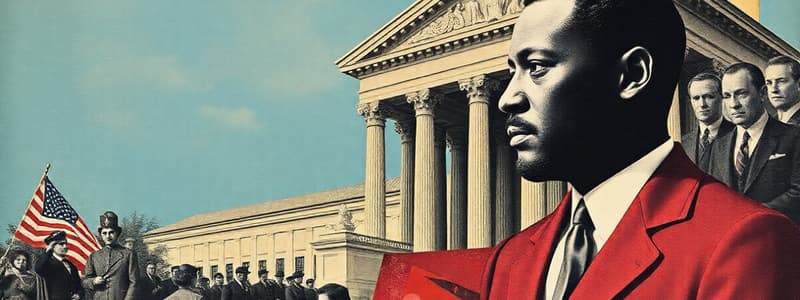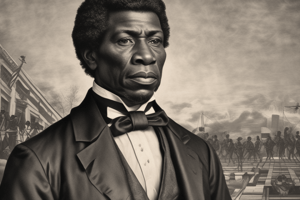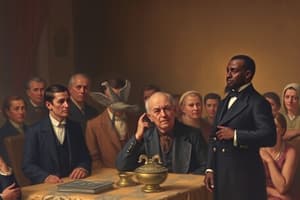Podcast
Questions and Answers
The Dred Scott case, formally known as Scott v. ______, centered around the question of citizenship for Black Americans.
The Dred Scott case, formally known as Scott v. ______, centered around the question of citizenship for Black Americans.
Sandford
Dred Scott was born in ______ around the beginning of the 19th century.
Dred Scott was born in ______ around the beginning of the 19th century.
Virginia
Scott's legal argument was based on the idea that residing in ______ territory entitled him to freedom.
Scott's legal argument was based on the idea that residing in ______ territory entitled him to freedom.
free
The Supreme Court ruled against Scott, declaring that enslaved African Americans could not be ______ of the United States.
The Supreme Court ruled against Scott, declaring that enslaved African Americans could not be ______ of the United States.
The ruling exacerbated existing tensions between the North and ______, contributing to the path towards the American Civil War.
The ruling exacerbated existing tensions between the North and ______, contributing to the path towards the American Civil War.
The decision established a new legal precedent, affirming that Black Americans remained an underclass without the rights of ______.
The decision established a new legal precedent, affirming that Black Americans remained an underclass without the rights of ______.
The Dred Scott decision contributed to the development of a '______ Enough' standard for citizenship.
The Dred Scott decision contributed to the development of a '______ Enough' standard for citizenship.
The case perpetuated the idea that non-white Americans were not entitled to dignity or ______, even after the abolishment of slavery.
The case perpetuated the idea that non-white Americans were not entitled to dignity or ______, even after the abolishment of slavery.
The legacy of the Dred Scott case continued to impact Black Americans' experiences even after the ______ Amendment's passage.
The legacy of the Dred Scott case continued to impact Black Americans' experiences even after the ______ Amendment's passage.
The persistent anti-black racism in the United States is a distinct form of ______.
The persistent anti-black racism in the United States is a distinct form of ______.
Flashcards
Dred Scott Case
Dred Scott Case
A Supreme Court case ruling on Black citizenship (1857).
Dred Scott
Dred Scott
An enslaved Black man who sued for his freedom.
Supreme Court Ruling
Supreme Court Ruling
Declared enslaved African Americans could not be citizens.
Impact on Civil War
Impact on Civil War
Signup and view all the flashcards
Legal Precedent
Legal Precedent
Signup and view all the flashcards
14th Amendment
14th Amendment
Signup and view all the flashcards
White Enough Standard
White Enough Standard
Signup and view all the flashcards
Anti-Black Racism
Anti-Black Racism
Signup and view all the flashcards
Abolitionists' Reaction
Abolitionists' Reaction
Signup and view all the flashcards
Legacy of Dred Scott
Legacy of Dred Scott
Signup and view all the flashcards
Study Notes
Dred Scott Case & Citizenship
- The Dred Scott case, formally known as Scott v. Sandford (1857), focused on the citizenship rights of Black Americans.
- Dred Scott, an enslaved Black man, was born in Virginia at the start of the 19th century.
- Scott resided in multiple states, moving from enslaved Missouri to the free state of Illinois and the free Wisconsin territory.
- Scott and his family were returned to slavery in Missouri after legal battles.
- Scott argued residing in free territory granted him freedom.
The Case's Fallout & Impact on US History
- The Supreme Court ruled against Scott, stating that enslaved Black Americans were not U.S. citizens.
- The ruling declared that neither enslaved nor free Black individuals could be citizens.
- Abolitionists saw the ruling as suppressing discussion about slavery's expansion.
- The decision heightened tensions between the North and South, contributing to the Civil War.
Consequences of Scott v. Sandford
- The ruling set a legal precedent, confirming Black Americans' second-class status.
- The ruling limited Black Americans' access to federal legal recourse.
- The 14th Amendment, granting birthright citizenship, did not erase the Dred Scott case's lingering impact on Black Americans.
The Dred Scott Case's Legacy
- The Dred Scott decision helped create a "white enough" standard for citizenship; immigrants needed to prove their whiteness to obtain opportunities.
- The ruling perpetuated the idea that non-white Americans lacked dignity and protection, even after slavery's end.
- The ruling created a wider gap between Black Americans and immigrant populations; both faced discrimination based on race.
Anti-Black Racism in US History
- The Dred Scott case, and its repercussions, exemplify deep-rooted anti-Black racism in the United States.
- Understanding racial prejudice is crucial for grasping the complexities of American history.
Studying That Suits You
Use AI to generate personalized quizzes and flashcards to suit your learning preferences.




